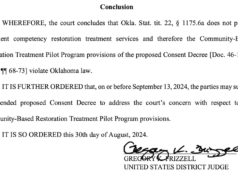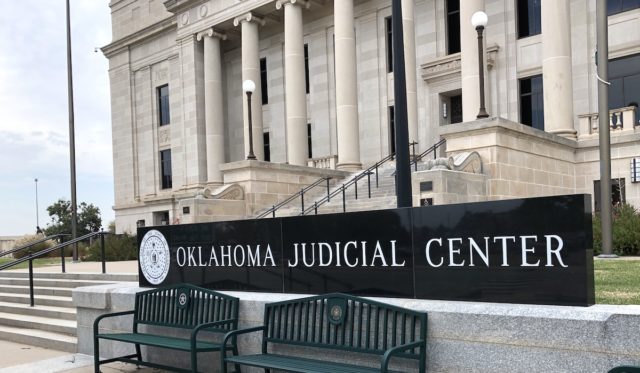

In the lead up to last week’s Oklahoma primary elections that resulted in some incumbents losing, other races headed to runoffs and a tie in the Carter County sheriff’s race, you might have missed a few developments concerning notable litigation.
In addition, an Oklahoma City Police Department officer was cleared in a shooting, and the treasurer of a terminated super political action committee was ordered to pay a $25,000 fine by the Oklahoma Ethics Commission.
The following roundup offers updates to important legal cases and other developments from the last couple of weeks.
McCurtain County election invalidated by 137-year-old law
The Oklahoma Supreme Court made the rare move of striking the results of a 2022 lodging tax election in McCurtain County, citing a 137-year-old law while simultaneously requesting that the Legislature update the statute. Based on an 1887 statute first enacted in the Dakota Territory, the decision marks the latest development in a southeastern Oklahoma political battle raging between Hochatown — a new and growing town with more than 2,000 vacation rental cabins that generate lodging tax revenue — and McCurtain County, a timber and tourism area in the far corner of Oklahoma and the Choctaw Nation.
Justice Yvonne Kauger wrote the unanimous opinion invalidating the 2022 lodging tax election and finding that McCurtain County failed to publish the ballot question in a county newspaper for “at least four weeks” as required by a state law last amended in 1910. The court endorsed a “strict compliance” standard for interpreting statutory election procedures, citing the Legislature’s constitutional authority “to prescribe the time and manner of holding all elections.” But the court also encouraged lawmakers to revisit Oklahoma election laws.
“Requiring anything less than strict compliance would result in judicial legislation,” Kauger wrote. “We do, however, encourage the Legislature to consider re-visiting, and possibly updating publication requirements to be more compatible with today’s methods of communication.”
Courts rarely ask the Legislature to change laws, but Oklahoma’s statutes involving public notice requirements and newspapers of record have often been criticized for their antiquated nature and lack of modernization to include internet notification. (Among Oklahoma’s other archaic statutes are laws like Title 21 Section 931, a provision that criminalizes charging a fee for fortune telling, which can carry up to a six-month sentence.) The statute violated by the McCurtain County Board of Commissioners when it did not advertise the election for four weeks was last amended in 1910, but it originated in a Dakota Territory law enacted in 1887 that was incorporated into Oklahoma Territorial law in 1890 before finally becoming state law in 1907.
In November 2022, the voters of McCurtain County approved a lodging tax increase of 2 percent, bringing the county lodging tax from 3 percent to 5 percent to fund the county-operated McCurtain Memorial Hospital. In May 2023, Hochatown won its election to incorporate as a town and also create its own lodging tax.
Lodging taxes are collected when people stay at hotels, motels or other temporary lodging like Airbnbs. In Oklahoma, businesses in a municipality are exempt from county lodging taxes if the municipality has a preexisting lodging tax and the county population is under 200,000. With the 2022 election invalidated, any new county lodging tax passed by McCurtain County would not be applicable to Hochatown since the municipality has created its own lodging tax.
It is unclear how McCurtain County will generate revenue for its county health care system without the additional lodging tax from Hochatown. The only clinic in Hochatown had been operated by the county hospital, but it closed in April with McCurtain Memorial Hospital CEO Brian Whitfield citing the facility’s lack of use by “locals,” the town’s opposition to the county lodging tax and the need to use operational costs to fund other facilities.
OKCPD officer cleared in May shooting in northwest OKC
(Editor’s note: The video below depicts a fatal shooting that may be upsetting to watch.)
An Oklahoma County grand jury recommended no charges against an Oklahoma City Police Department officer for the May 5 shooting death of Kenneth Allsen.
On that day, police were called to respond to a domestic dispute at a residence in the 7400 block of Northwest 106th Street. Allsen had discharged his rifle before officers arrived and found him outside of the residence. As captured in home surveillance camera and police body camera footage (embedded above), Allsen was on the phone when he approached the first responding office and repeated “put it down.” As a second officer arrived and told the first officer that he had a Taser drawn, Allsen turned away from the officers, leaning on his truck and speaking on the phone. Seconds later, Allsen said, “I love you,” as he turned and drew a gun from his waist. At that point, both officers discharged their weapons — one with a rifle and one with a Taser — and Allsen died at the scene.
Before officers arrived, surveillance video showed Allsen in his driveway, appearing agitated as he walked in front of four parked cars with a semiautomatic rifle over his shoulder. According to his LinkedIn, Allsen served 18 years in the U.S. Army and did multiple tours of duty in the Middle East and Korea. He also worked in the oil and gas industry.
According to a press release from the office of Oklahoma County District Attorney Vicki Behenna, the grand jury heard from two witnesses and saw 22 exhibits before it “recommended no charges be filed.” The exhibits included body camera video, as well as surveillance video and interviews with witnesses. In 2023, Behenna announced she would present all officer-involved shooting investigations to a grand jury instead of making decisions about officers’ criminal culpability herself.
Terminated PAC’s treasurer to pay $25,000 fine for violations
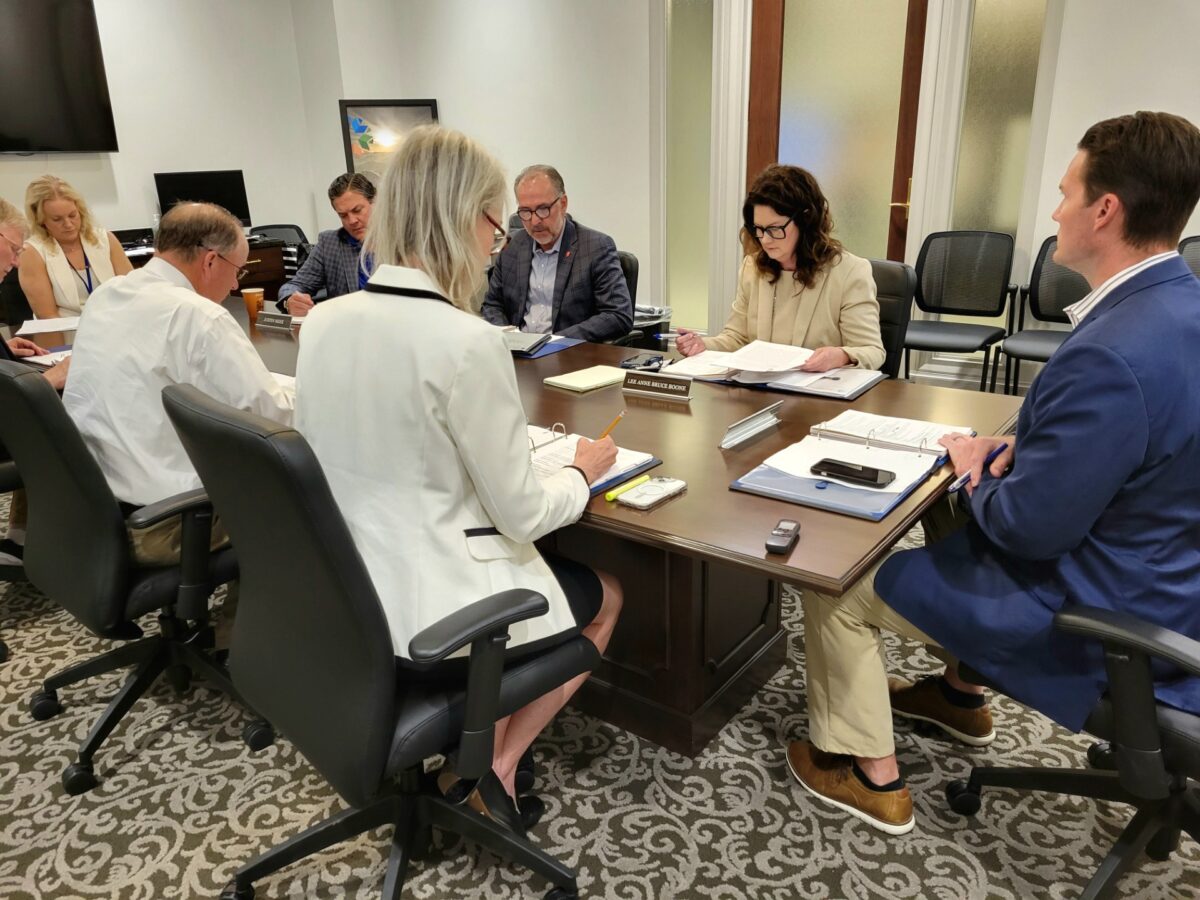
The treasurer of a now-terminated conservative political action committee that had been active during the 2020 election cycle and has agreed to pay $25,000 in civil penalties in a settlement reached with the Oklahoma Ethics Commission.
Jonathan Bennett Krems, who was listed as treasurer of Make Oklahoma Great Again PAC, must pay the fine from his own personal funds and not from any campaign fund accounts, according to the settlement agreement approved by members of the Ethics Commission on June 14.
Asked by NonDoc whether he had a comment on the settlement, Krems replied, “No.”
The $25,000 is to be paid to the state’s General Revenue Fund, the state’s main operating fund, according to the agreement. The fine is to be paid in monthly payments through June 2026.
According to the agreement, Krems is to pay $2,000 to the stat no later than July 31. Beginning no later than Aug. 30, Krems is to pay $1,000 by the last day of every month through June 30, 2026.
In the agreement, Krems admitted responsibility for violating Ethics Commission rules by:
- Failing to register Make Oklahoma Great Again as an Oklahoma PAC;
- Failing to file reports disclosing contributions and expenditures of the PAC; and
- Failing to file reports of independent expenditures.
In addition, Krems agreed to receive education and training as specified by the Ethics Commission before representing any PAC in the future.
Little information is known about the Make Oklahoma Great Again PAC, which listed Krems as treasurer and an Edmond address when it was formed June 10, 2020. Krems is a conservative activist and attorney who runs Liberty Legal Solutions.
According to Open Secrets, a nonprofit that tracks and publishes data on campaign finance and lobbying, Make Oklahoma Great Again was a super PAC. During the 2020 election cycle it raised $50,100 and spent $46,690. In the 2022 election cycle, the PAC raised no funds and spent the remaining $3,410 it had on hand. Open Secrets identified Krems’ PAC as a Republican/conservative PAC.
The Frontier reported in August 2020 that Make Oklahoma Great Again spent $45,000 on June 27 on multimedia to support then-House District 11 candidate Wendi Stearman, who reported in her campaign filings that she spent no money on her race. She defeated then-Rep. Derrel Fincher (R-Bartlesville) in the June 30 Republican primary election. Federal Election Commission records show Make Oklahoma Great Again reported spending $1,518 on multimedia for Stearman on July 9. Stearman (R-Collinsville) went on to win in the Nov. 3 general election, although she lost her 2022 reelection bid and failed last week in an effort to unseat Sen. Julie Daniels (R-Bartlesville).
Make Oklahoma Great Again’s last report was filed Dec. 31, 2020, according to Open Secrets.
The FEC wrote Krems a letter on Dec. 18, 2020, stating that he had failed to file a report of receipts and disbursements or had failed to file a report covering the entire reporting period as required by the Federal Election Campaign Act.
The FEC on June 8, 2023, wrote Krems, who then had a Broken Arrow address, a letter terminating the Make Oklahoma Great Again PAC.
In other action at the June 14 Ethics Commission meeting, executive director Lee Anne Bruce Boone told commissioners the Office of Management and Enterprise Services will soon send out requests for proposals for a new database system used for reporting and tracking campaign financial information and lobbyist registrations. The commission’s Guardian System had been scheduled to lose functionality after July 1 because the software and services firm Civix had decided to shelve the underlying software used to operate Oklahoma’s reporting system. Since then, the company has agreed to extend software support for the Guardian system. It’s hoped the new system is operating by July 1, 2025, Bruce Boone said.
With the five-year terms of Chairman Jarred Brejcha and Vice Chairman Gregg Engle expiring in July, commissioners elected a chairman and a vice chairman to hold the posts until October, when commissioners usually elect officers. Former Sen. Eddie Fields was elected as chairman, and Justin Meek was elected vice chairman. House Speaker Charles McCall (R-Atoka) will appoint someone to fill Brejcha’s position, and Senate President Pro Tempore Greg Treat (R-OKC) will fill Engle’s slot.
Federal court halts enforcement of Oklahoma’s classroom censorship law
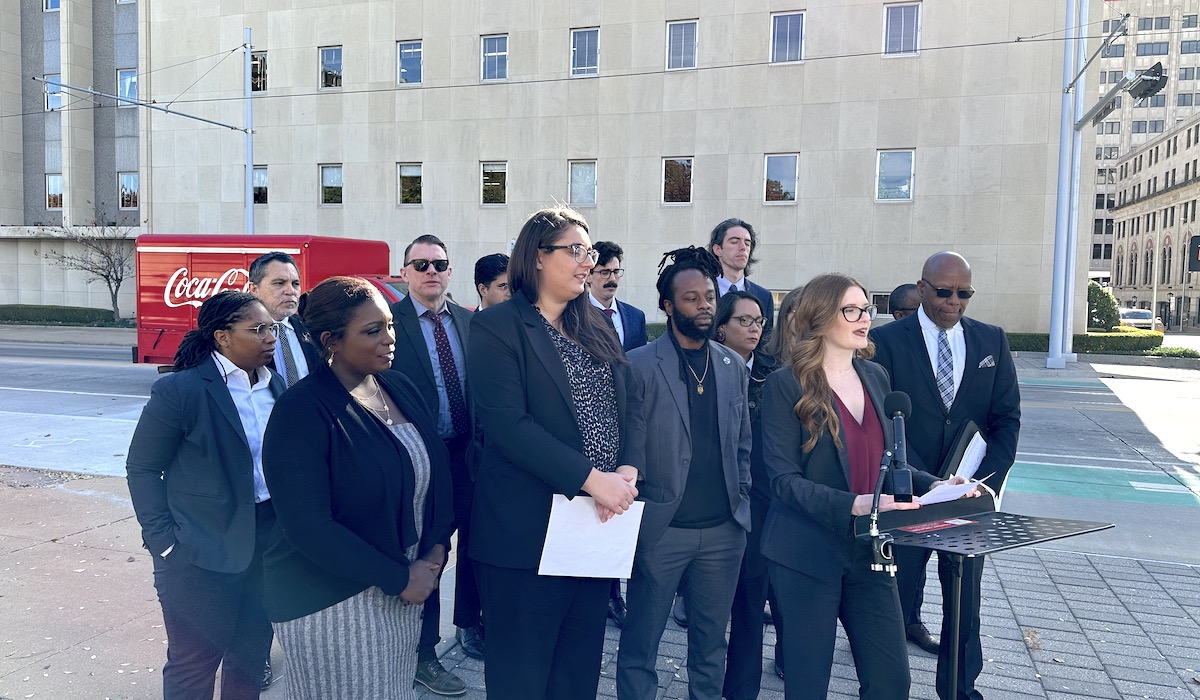
Parts of House Bill 1775, Oklahoma’s purported “critical race theory” ban passed in 2021, may not be enforced after a federal judge partially granted a temporary injunction against the act June 14.
The law, which State Superintendent of Public Instruction Ryan Walters has praised as a vehicle to ban “critical race theory” and “liberal ideology” in classrooms, does not actually mention the college-level concept taught at some universities. Rather, it bans a number of possible teachings and courses dealing with race and gender at both the university and K-12 levels.
The law had been challenged in October 2021 in the U.S. District Court for the Western District of Oklahoma by a number of plaintiffs alleging it is unconstitutionally vague and violates the First and 14th amendments. Federal Judge Charles Goodwin held a hearing for the case in December 2023, but little had occurred over the last six months.
In his June 14 order, Goodwin specifically enjoined the defendants, which include the University of Oklahoma, the State Department of Education, attorney general and others, from enforcing the word “require” in a provision of the act prohibiting universities from mandating “any orientation or requirement that presents any form of race or sex stereotyping or a bias on the basis of race or sex.”
Additionally, Goodwin enjoined two clauses in their entirety relating to public schools which:
- Prohibit teaching that “an individual should be discriminated against or receive adverse treatment solely or partly because of his or her race or sex;” and
- Prohibit teaching that “members of one race or sex cannot and should not attempt to treat others without respect to race or sex.”
In his temporary injunction order, Goodwin examined each part of HB 1775, giving analysis on each clause of the act and separating his analysis by whether a particular clause applied to higher education or K-12 education.
With respect to higher education, Goodwin determined that plaintiffs — the Black Emergency Response Team and local chapters of the AAUP, NAACP and AIM — lacked standing to challenge the act’s prohibition on “mandatory gender or sexual diversity training.”
Next, Goodwin determined that plaintiffs made a “strong showing” that the act’s next prohibition on orientations or requirements that present “any form of race or sex stereotyping or a bias on the basis of race or sex” was too vague to be enforced.
With respect to public schools, Goodwin concluded that while the plaintiffs did not have a strong First Amendment claim because the state is allowed to regulate curricular K-12 speech, parts of the act applying to public schools were still too vague.
Goodwin said one part of the act prohibiting public schools from teaching that “an individual should be discriminated against or receive adverse treatment solely or partly because of his or her race or sex” was both too broad and “unclear.”
“Subsection (c) would also — on its face — prohibit a teacher from making part of a course ideas that are subjects of current political debate (e.g., whether it is permissible to consider race or sex in college admissions or through an affirmative action hiring plan) or ideas that are accepted by a significant number of people and are reflected in current law (e.g., that men but not women should be subject to military conscription),” Goodwin wrote.
Goodwin made a similar conclusion for the next subsection of the act, which prohibits schools from teaching that “members of one race or sex cannot and should not attempt to treat others without respect to race or sex.”
But Goodwin also upheld multiple parts of HB 1775, particularly a provision that prohibits schools from teaching that “any individual should feel discomfort, guilt, anguish or any other form of psychological distress on account of his or her race or sex.”
Goodwin said the use of the word “should” means teachers can teach about uncomfortable racial and sexual topics, despite plaintiffs’ claims otherwise.
“Contrary to plaintiff’s concerns, the text of subsection (g) does not prohibit the teaching of subjects involving race or sex merely because they might cause a student to feel discomfort or distress,” Goodwin said. “Take as an example a student who is discomfited upon learning about a historical event in which persons of her race harmed persons of another race. That student’s reaction to the facts of the event would not, absent more, mean that a teacher impermissibly taught that the student ‘should feel discomfort … on account of … her race.'”
Also on June 14, Goodwin ruled on the defendants’ motions to dismiss the case, dismissing some of the plaintiff’s claims but allowing some others to remain. Goodwin also ordered that some questions of state law brought in the case be brought to the Oklahoma Supreme Court.
Wrongful termination case against Ryan Walters to continue
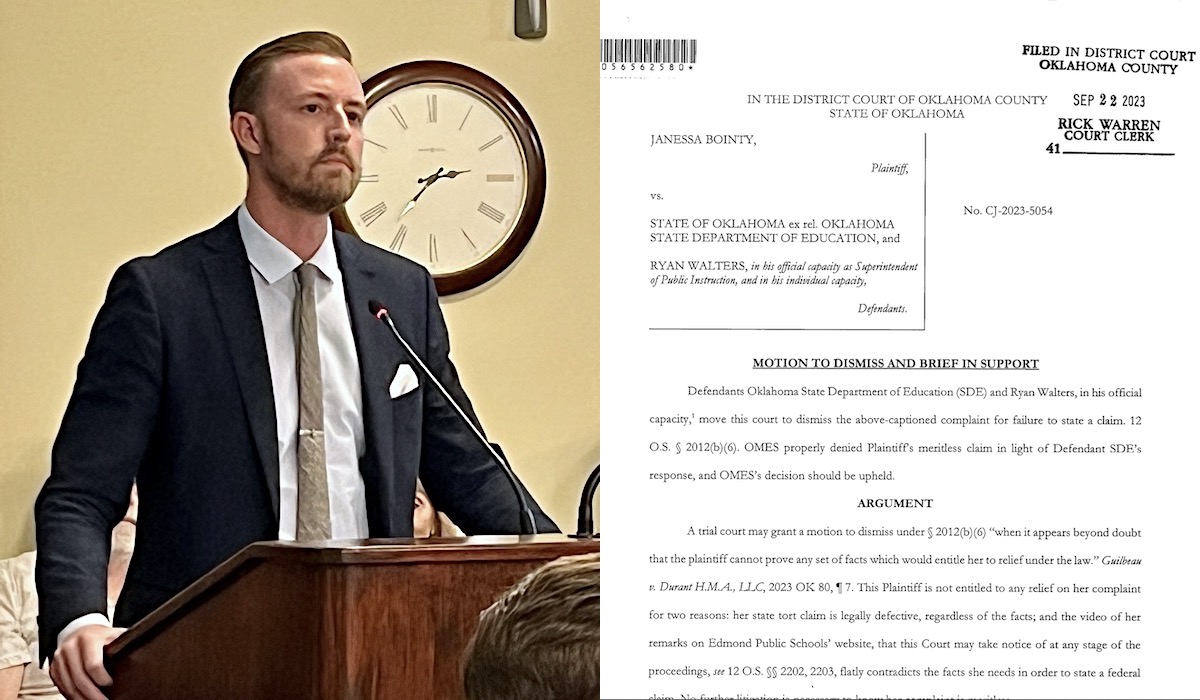
A federal wrongful termination lawsuit against State Superintendent of Public instruction Ryan Walters and the State Department of Education will continue against Walters in his personal capacity after a judge mostly denied his motion to dismiss June 12.
The lawsuit was originally filed Sept. 1 in Oklahoma County District Court by Janessa Bointy, a former OSDE employee.
Bointy is an Edmond parent and former school counselor specialist for Project AWARE, a federal Substance Abuse and Mental Health Services Administration grant-funded OSDE program meant to provide mental health services for students. She was fired in March 2023 after she spoke at an Edmond Public Schools board meeting about mental health services and the grant in the wake of a student suicide that rocked the community. Bointy maintains that she spoke in her personal capacity and only used publicly available information in her speech to increase awareness about the grant program.
Bointy filed her wrongful termination suit against OSDE and Walters in both his individual and official capacities.
After Oklahoma County District Court Judge Sheila Stinson declined to dismiss the lawsuit against OSDE and Walters in his official capacity in November, the defendants requested that the case be moved to the U.S. District Court for the Western District of Oklahoma.
Stinson had left one motion pending in November: Walters’ motion to dismiss the case against him in his individual capacity. When the case was shifted to federal court, Walters again asked that the case against him as an individual be dismissed.
Seven months later, Judge Stephen Friot dismissed one of Bointy’s claims against Walters without prejudice but allowed a civil rights claim against him to stand.
“The court concludes that Walters is not entitled to qualified immunity with respect to Bointy’s § 1983 First Amendment retaliation claim, and Walters’ dismissal motion with respect to that claim will be denied,” Friot wrote in his order.
Friot granted Walters’ motion to dismiss Bointy’s Burk tort claim. In Oklahoma, the Burk tort allows at-will employees to sue their employers for wrongful termination when the employer violates public policy.
Friot essentially said he could not rule on whether Bointy was an at-will employee or not given that motions to dismiss typically do not involve the consideration of evidence. Additionally, Bointy’s attorney said after the ruling that Burk torts can only be directed at employers, not individuals, so she was unsurprised by Friot’s dismissal of that claim.
“Fair enough that the judge dismissed it, and I don’t intend to refile it against Mr. Walters, but I do think the order is very clear that it does not affect our Burk tort against the state, and that’s where it would belong properly,” said Leah Roper with the Center for Employment Law.
With Friot’s ruling allowing the case against him to continue, Walters will next have to file an answer to Bointy’s original petition, allowing the case to move into the discovery phase. OSDE and Walters in his official capacity already filed an answer to Bointy’s petition in November.
Judge (again) lets State Board of Education case continue
In a June 20 hearing, Oklahoma County District Court Judge Don Andrews allowed a case against the State Board of Education and State Superintendent of Public Instruction Ryan Walters to continue for the second time.
Andrews denied the defendants’ motion to dismiss Infinity Generation Generals Preparatory School’s allegations of the board’s violations of the Open Meeting Act and the Administrative Procedures Act, something he did for the first time in January.
IGG, an Oklahoma City private school, brought the case in September after the board voted to not accredit the school in August owing to the fact that it had shut down halfway through the 2022-2023 school year. Private schools are allowed to participate voluntarily in the State Department of Education’s accreditation process.
But IGG’s lawyer, Jim Johnson, pointed to Attorney General Gentner Drummond’s April 2023 opinion concerning OSDE rules and argued that OSDE’s rule concerning accreditation for private schools was invalid and that the board violated the school’s due process rights by granting the school an administrative hearing in August while also insisting that the vote was simply a nonrenewal of accreditation, not a revocation of accreditation.
Johnson also argued that the board never actually filed an order stipulating IGG’s new accreditation status and that the board’s decision not to accredit IGG was invalid until it did so.
The board is being represented in this case by Assistant Attorney General Erin Moore, who argued that the board’s August decision was itself the necessary order.
Andrews’ dismissal of the board’s motion to dismiss means the case will likely now move into the discovery phase to allow both parties to make arguments on the board’s rule promulgation process and whether it violated the Open Meeting Act and the Administrative Procedures Act.
“If that AG opinion is upheld, it’s going to affect a lot of agency programs, and that is something that should be screamed out loud because (the State Board of Education) knows that they’re not looking for statutory authority,” Johnson said after the hearing. “They’re looking for ways to do the things they want to do without statutory authority.”












